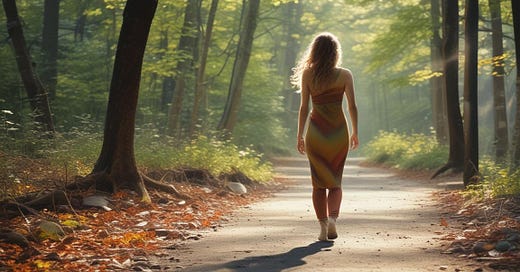It was a hot July day. Sitting in the back seat of a stuffy car, I turned to my new friend Amy and said, “Wouldn’t it be amazing if we could make every decision from our body instead of the mind?” She smiled at me and said, “Yes. That is the dream.”
We were both floating high after a five night silent meditation retreat at Cloud Mountain in southern Washington. Heather Sundberg was our teacher and the theme of the retreat was, “Body Wisdom.”
We spent five days, 16 hours a day meditating with the intention to be in our bodies. Days were full of various forms of practice. Periods of sitting meditation, followed by walking meditation, Qi Gong, eating meditation and some chanting.
At the end of the retreat, my body felt like it vibrated in the tone of OM. My sense doors were open like tentacles—feeling the world instead of judging it with my mind. The body was sensitive like a metal detector—beeping with joy when it experienced nourishing food, movement or words. She silently expressed “not for me” like dancing seaweed moving in a strong current of water—ducking and diving out of the way with grace.
Even though I have the intention to make decisions from my body every day, the world is noisy which makes it hard to hear, feel and know what she is communicating. Difficult to discern who’s talking, my head or my body? Truth or past trauma?
The majority of our lives, we are trained to be in our heads. School fills us with knowledge and critical thinking skills. It takes most people an introduction to mindfulness based movement to be able to listen to the hum of the body communicating beneath the loud noise of our thoughts. I know I did.
Being on a silent retreat let my sense doors rest and re-open with more clarity. Sense doors, described in Buddhist thought, refers to our “six senses.” We experience the world in the present moment through sight, sound, feel, smell, taste and the sixth sense being the mind. The mind/heart holds the places where thoughts, images and feelings reside.
When on a silent retreat, the conditions are the opposite of home life, which creates fertile ground to reset the senses. The retreat space is rested in a forest of tall trees and fluffy ferns. Bathing in the forest absorbs and composts the charged energy and stress we carry in our lives (check out the science and benefits of forest bathing here). We switch off of autopilot and familiar mode and instead active present mode. Our senses feel their way through the retreat, helping us gently build our mindfulness muscles.
Slowing down on retreat, I feel the pores in my skin take a deep breath in and out. My body communicates not through verbal language, but through sensations. The silence helps me listen and decode interocpetion signals:
A pulling down hallow sensation tells me I am hungry.
Needing love, connection and affection feels like a tender ping and magnetic pull in my heart center.
Desire for a walk feels like a flush of warm windy energy from my feet up to my waste and face.
Needing rest feels like a heavy backpack on my shoulders. A weight on my chest. Dry eyes and gravity pulling my eye lids down.
Thirst feels like dry sandpaper on my tongue, yearning for hydration.
Learning the sensations of our bodies is a language. A unique language to each individual. There is no script, hack or short cut you can take. It takes time and attention to discern. The body is always evolving, which means her language is too.
Retreat conditions are unique. We can’t be on retreat a majority of our lives so we need a practice that can help us stay connected to our sense doors in our busy every day lives. That’s where the practice of noticing can support us.
The key ingredient to noticing is slowing down. We can’t read a sign on the highway if we are driving too fast. The same is true for our bodies. Slowing down helps us absorb the information. The slower pace creates a smoother surface for us to discern what’s happening. Our mindfulness muscles gets activated as we observe the present moment.
Throughout the day, try slowing down just 10% and check-in with your senses. Start small and ask yourself:
What is one thing I can hear right now?
What’s one thing I can taste right now?
What’s one thing I can smell right now?
What’s one thought I can label right now?
What’s one thing I can feel and touch right now?
What’s one thing I can see right now?
The more you can notice life through your senses, the more you can get out of the stories in your mind. The connection to your body gets stronger. You build more self-trust and feel fully aligned and alive in your own skin.
Try it out this week and let me know what you start to notice.





